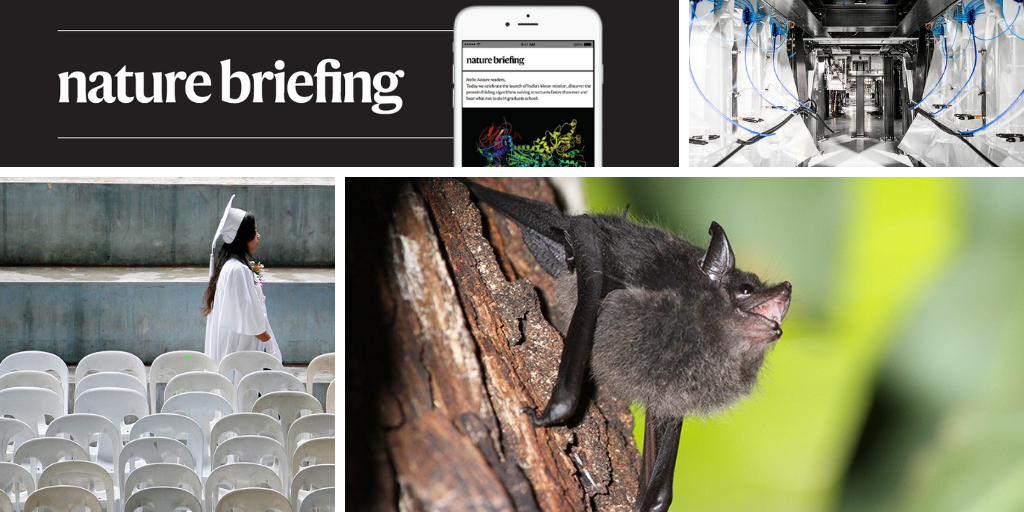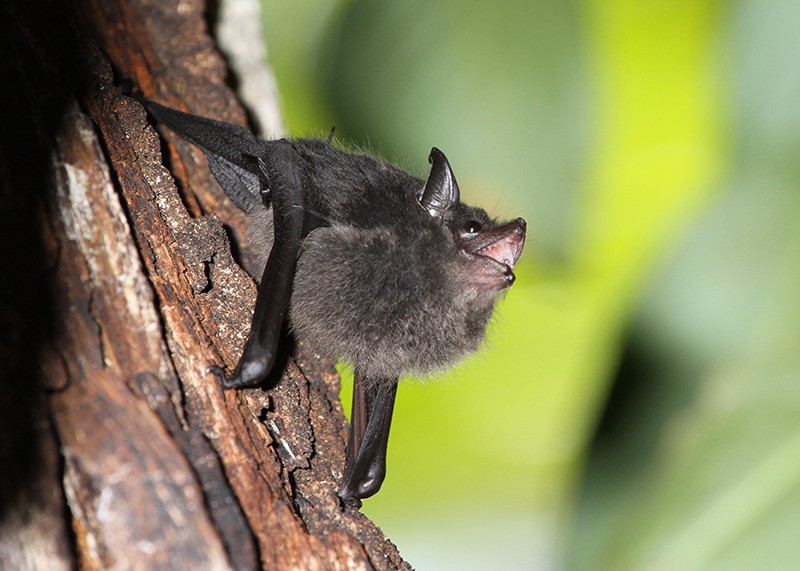Hello Nature readers, would you like to get this Briefing in your inbox free every day? Sign up here.
Pups of the greater sac-winged bat develop their vocal skills by babbling in a similar way to human babies — a discovery that could help researchers to explore the underlying neuroscience of how mammals learn to communicate. Human infants babble to practise speech sounds, which require precise motor control over their voice boxes, research suggests. Young songbirds also babble, but there are very few other recorded examples of babbling behaviour among animals — the bat research is the first to identify baby babble produced by a mammal that isn’t a primate.
The 1987 Montreal Protocol, which effectively banned ozone-killing chemicals, played a significant part in protecting the planet’s ability to absorb carbon. In a chilling scenario of what might have been, researchers estimated that, without the protocol, increasing production of chlorofluorocarbons and other ozone-depleting substances would have contributed to global air temperatures rising by an additional 2.5 °C by the end of this century. The ozone layer would have collapsed by the 2040s. And the resulting damage to vegetation would have led to 580 billion tonnes less carbon stored in forests, other vegetation and soils by 2100.
Researchers have broken a world record by calculating the mathematical constant pi to 62.8 trillion digits, beating the previous record of 50 trillion digits. The calculation took a supercomputer 108 days to complete. Researchers say the effort was an important benchmarking exercise for computational hardware and software. “Why do you do pi? You do pi because everyone else has been doing pi,” says mathematician David Harvey. “That’s the particular mountain everyone’s decided to climb.”
Features & opinion
The quest for emissions-free, almost limitless energy from fusion — the phenomenon that powers the Sun — has been given fresh urgency by the need to slash carbon emissions and pollution. Government-funded mega projects have been joined by dozens of private fusion companies pushing towards commercialization. A new book by data scientist Arthur Turrell offers a realistic and hopeful snapshot of the current situation and key players, writes reviewer and plasma physicist Melanie Windridge.
Studying the precarity of academic-research careers as part of her PhD didn’t protect Kelsey Inouye from the stress of her own postgraduate job search. “No amount of reading or academic knowledge could have prepared me for the sense of failure I felt,” she writes. “What helped most was learning to separate my sense of identity from academic success.” Now a postdoc researcher in career trajectories of people with PhDs, she shares evidence-based strategies to manage post-PhD imposter syndrome.
Enjoy a bumper crop of short stories for Nature’s Futures series:
• In Between worlds, a modified human experiences the wonder of flying between the stars — and the slog of just getting through the day. (5 min read)
• In A dying world, overheated and nearly ruined, a microcosm of global heating is treated by an IT expert on the help desk. (6 min read)
• In Terraforming the heart, a young terraforming artist working her way out of poverty learns that your opponent isn’t necessarily your enemy. (5 min read)
Andrew Robinson’s pick of the best of the latest science books includes amazing ants, brain maps, and mammals before the dinosaurs.
Many common science terms do not have a consensus translation in African languages that are spoken by millions. Members of a research project called Decolonise Science plan to translate 180 scientific papers from the AfricArXiv preprint server into isiZulu and Northern Sotho from southern Africa; Hausa and Yoruba from West Africa; and Luganda and Amharic from East Africa.
The deadline for authors to submit their preprint, postprint, or book chapter to AfricArXiv for translation is 31 August. Here is all the info if you would like to know more.
Nature Podcast | 33 min listen
Subscribe to the Nature Podcast on Apple Podcasts, Google Podcasts or Spotify.









More News
Author Correction: Bitter taste receptor activation by cholesterol and an intracellular tastant – Nature
Audio long read: How does ChatGPT ‘think’? Psychology and neuroscience crack open AI large language models
Ozempic keeps wowing: trial data show benefits for kidney disease